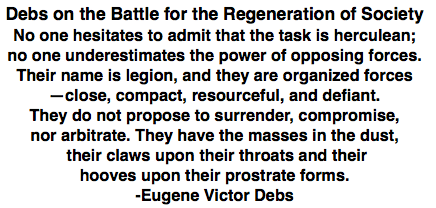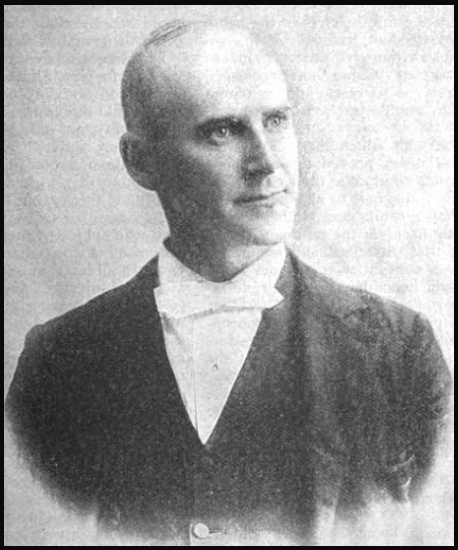 ~~~~~~~~~~~~~~~~~~~~~~~~~~~~~~~~~~~~~~~~~~~~~
~~~~~~~~~~~~~~~~~~~~~~~~~~~~~~~~~~~~~~~~~~~~~
Hellraisers Journal – Sunday October 9, 1898
Debs on Capitalism Run Riot and the Battle for Social Democracy
From the Social Democratic Herald of October 8, 1898:
Social Democracy
-by Eugene V. Debs
In the outset, and to “clear the deck” for action, some attention should be paid to definitions. What is meant by the term, “Social Democracy?” The term “social” as applied to “democracy” means, simply, a society of democrats, the members of which believe in the equal right of all to manage and control it. Reading this definition, men are likely to say, “There is nothing new in that,” and they speak understandingly. The men and women who are engaged in organizing the Social Democratic Party of America are not pluming themselves upon the novelty of their scheme for the improvement of social, industrial, and political conditions. They claim for their movement a common-sense basis, free from the taint of vagary and in all regards preeminently practical.
The wise man is credited with saying, “The thing that hath been, it is that which shall be; and that which is done is that which shall be done: and there is no new thing under the sun” [Ecclesiastes 1:9]. Crediting the declaration of Solomon as conclusive, there must have been a time before he lived when something like “social democracy” of which I write existed in the earth, the germ idea of which, though latent for centuries, has aroused men from their lethargy from time to time in the processes of evolution, to find its most potent expression in the present era of “progress and poverty,” civilization and savagery, wealth and war, charity and greed, aroused them to an interest in socialism, which, with the chivalric courage of crusaders and the revolutionizing zeal of iconoclasts, has appeared to do battle for the regeneration of society.
No one hesitates to admit that the task is herculean; no one underestimates the power of opposing forces. Their name is legion, and they are organized forces—close, compact, resourceful, and defiant. They do not propose to surrender, compromise, nor arbitrate. They have the masses in the dust, their claws upon their throats and their hooves upon their prostrate forms. In the face of all the verified facts that startle thinking men, there is no requirement for extravagant speech.
But conditions as they exist are artificial, not natural. They were created by men, and may be changed by men, since it is a truth “that where there is a will there is a way” to elevate humanity as certainly as where there is a will there is a way to degrade it, and social democracy has one central pivotal purpose, the amelioration of social conditions and the emancipation of the victims of a vast brood of wrongs, all of which converge and consolidate in one great and overmastering wrong of robbing them under the forms of law, of the fruits of their toil, and thereby reducing them to a condition where men dispose of their manhood and women of their chastity for the means of continuing lives that are a ceaseless horror.
No well-informed honest man either doubts or attempts to controvert the proposition. It is as self-evident as the law of gravitation. It is the crime of the ages, the one great curse resulting from “man’s inhumanity to man,” the ever-present and threatening calamity which wage-earners are required to face and provide against as best they may.
Capitalism is running riot throughout the land. The private ownership of the means of production, that is to say, the means of life, is doing its deadly work. The trusts, syndicates, and corporations, with more eyes and hands than any mythological monster ever possessed, concoct new schemes of spoliation and the masses sink to lower depths of poverty, want, woe, and degradation.
The picture is not overdrawn. A Hogarth’s hand would relax its hold upon its pencil in tracing the horrors of a sweatshop or the agonies of the lives of tramps. Dante would look in vain throughout the realms of the infernal for incidents more horrifying than are found in the deep, dark, mining hells where miners work and famish. Only a Milton would be equal to the task of depicting the wreck and ruin wrought by the capitalist system in a land which should be a paradise, but which has been transformed into an arena more horrible than those where Roman emperors delighted to torture the victims of their vengeance.
All over this fair land, in every center of population, in mine and factory and shop, and spreading out into the forest, field, and farm, where bird and bee and brook make merry music and the winds transform leaf and spray into harps, where the flowers vie with the stars in making the earth as beautiful as the sky above, iron-tongued and iron-handed monsters of greed and lust, conscienceless as a Moloch and as relentless as death, have inaugurated wretchedness and poverty until from ocean to ocean, from valley to mountaintop, rises one unceasing complaint, touching every note in the scale of discontent and anger, while statesmen and students, philosophers and philanthropists, amazed and aghast, contemplate environments and await developments.
The millions of wage-earners do not own themselves, they are wage-slaves, and their masters control their lives and subject them to conditions as degrading as those which existed in times of chattel slavery. True it is that the united forces of labor could make themselves masters of the situation and change conditions to their liking, but divided on lines of political partisanship, intimidated, bulldozed, and bribed, they have done the bidding of the capitalist class, have been misled and betrayed by ignorant and dishonest leaders until hope has all but perished.
At this supreme juncture socialism has come into view and advances to the arena. It offers a remedy for social ills which must be mitigated if peace and prosperity are to come to the land. It strikes at the very root of capitalism by proposing to transfer the means of production and distribution, i.e., the land, mines, factories, railroads, machinery, etc., from private capitalists to the whole people to be operated by them in their collective capacity for the good of all, and this it proposes to do by the ballot of a triumphant majority of awakened, class-conscious supporters. The revolution is to be complete, but it is to be achieved by the ballot.
From the date of the introduction of chattel slavery into the British colonies of America to the time when the shackles fell from the limbs of 4 million slaves by the proclamation of Abraham Lincoln, 243 years had elapsed. But it was amidst the smoke and carnage of war, when a thousand streams ran red to the sea, that chattel slavery with its blocks and whips and pens disappeared from the land.
Wage-slavery has now in the United States a firmer standing than was ever secured by chattel slavery. For two centuries and a half no gleam of hope flashed upon the darkness in which the chattel slave lived and wrought and died, but along all the years, forces were being evolved to secure his rescue, culminating in a war of calamities unparalleled in the history of the world.
Socialism would work out the redemption of the wage-slave without a sanguinary conflict. Its emancipating program includes no bloody ordeals. It unfurls to the winds no battle banners except those inscribed with peace and goodwill to man. Its first great proposition is to educate workingmen and by an act which requires an exercise of willpower, to stand forth, redeemed and disenthralled, from the domination of any other man or set of men under heaven. This can be done. It is the initial step to a higher plane of existence and a nobler life, where men grow and expand to their full stature. It is a step which evinces the beginning of wisdom. He who takes it plucks for his own behoof and those dependent upon him the richest fruit that has grown on the tree of knowledge of all the ages.
Thousands are doing their own thinking and are conscious of their class interests in the economic struggle. They are organizing everywhere. The movement is international.
The following is from the declaration of principles of the Social Democratic Party of America:
The control of political power by the Social Democratic Party will be tantamount to the abolition of capitalism and of all class rule.
The solidarity of labor connecting us with millions of class-conscious fellow-workers throughout the civilized world will lead to international socialism, the brotherhood of man.
Capitalism is to culminate in socialism. The scepter it has wielded so long and so mercilessly in the interest of its class is soon to fall from its nerveless grasp. It is destroying itself and from its ruins will rise the Cooperative Commonwealth.
[Photograph, paragraph breaks and emphasis added.]
~~~~~~~~~~~~~~~~~~~~~~
SOURCE
Eugene V. Debs Internet Archive
https://www.marxists.org/archive/debs/
Debs Internet Archive, 1898
https://www.marxists.org/archive/debs/#1898
“Social Democracy” by EVD
https://www.marxists.org/archive/debs/works/1898/981001-debs-socialdemocracy.pdf
From:
Social Democratic Herald
-Published by the Social Democratic Party of America
(Chicago, Illinois)
-Oct 8, 1898
https://www.loc.gov/item/sn82015741/
IMAGE
EVD, New Time Magazine, Feb 1898
https://play.google.com/books/reader?id=ixhGAQAAMAAJ&printsec=frontcover&pg=GBS.PA79
See also:
Tag: Social Democratic Party of America
https://weneverforget.org/tag/social-democratic-party-of-america/
Progress and Poverty by Henry George
-1st edition 1879
https://en.wikipedia.org/wiki/Progress_and_Poverty
Progress and Poverty: An Inquiry Into the Cause of Industrial Depressions and of Increase of Want with Increase of Wealth. The Remedy
-by Henry George
D. Appleton and Company, 1881
https://archive.org/details/cu31924013685460/page/n11
William Hogarth
https://en.wikipedia.org/wiki/William_Hogarth
~~~~~~~~~~~~~~~~~~~~~~~~~~~~~~~~~~~~~~~~~~~~~

